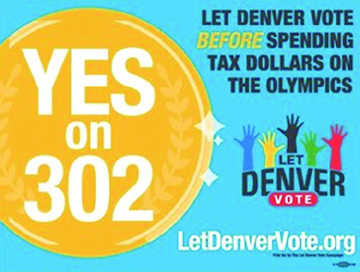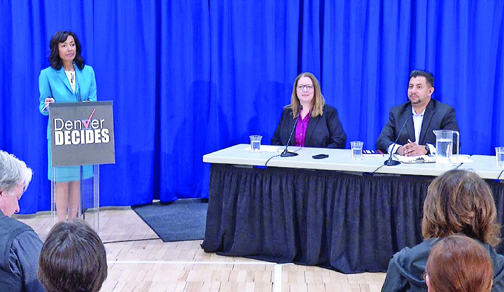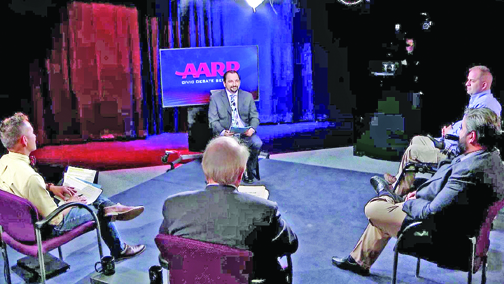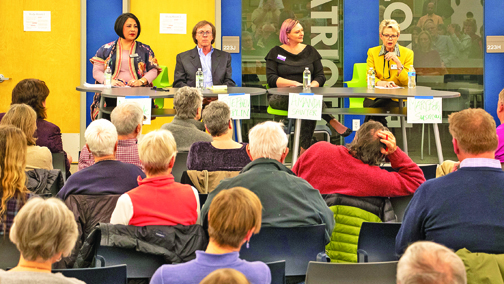by Glen Richardson

While the runoff for the next Mayor of Denver has taken most of the media attention, there are five runoff spots for City Council as well as the City Clerk and Recorder position on the June 4 ballot. In addition, there is a vote on Initiated Ordinance 302 which would mandate voter approval before Denver spends money on trying to lure the Winter Olympics to the city. The proposition was not on the May 7 ballot as the necessary petitions were not turned in until after the day for inclusion in that voting.
The Council runoff races are in Districts 1 (the Highlands and Federal Boulevard area in North Denver), District 3 (West Denver including Sloan’s Lake), District 5 (Central Southeast Denver including Hilltop and Crestmoor), District 9 (Downtown Denver and Five Points, and District 10 (Cherry Creek and Country Club). Three of the races involve incumbents (Districts 5, 9, and 10) which is abnormally high in a city that has upset an incumbent only once in the last three-and-one-half decades (Espinoza over Shepherd in District 1 in 2015). This indicates, according to some, a high level of unhappiness on how growth has been managed in the City and County of Denver during Michael Hancock’s eight years in office, which the City Council in large part controls.

In the runoff for City Clerk and Recorder, term-limited City Councilman Paul Lopez drew only 37% of the vote in the first round which surprised many election observers given his high name recognition. His personal backing of a massive Sloan’s Lake development has been his anathema to some voters. Others attribute Lopez’s poor showing to a disastrous debate performance against Peg Perl who appeared to be highly qualified for the position, while Lopez came across, at best, as amiable but incompetent for the position.
Another surprise in the first round was the showing in District 9 of Councilman Albus Brooks who is deemed by many the heir apparent to Mayor Hancock. He bested challenger Candi CdeBaca in the first round by only 45% to 43%. Voters appeared upset by Brooks being too close to the business group the Downtown Denver Partnership and high-density developers. New developments in the district have forced many African American families who have lived in the district for generations out of Denver.

In District 10 incumbent Wayne New received 39% of the round on May 7 while challenger Chris Hines attracted 30% of the vote. Some felt New did not do enough to challenge Mayor Hancock on myriad issues in his first term, but many fear Hines will be little more than a puppet for developers if he were to get into office.
In Council District 1 the leader of control growth on the Council, Rafael Espinoza elected not to run for a second term after upsetting incumbent Susan Shepherd in 2015. He indicated he could do more outside of Council to encourage reasonable and beneficial growth, and strongly backed his top aide Amanda Sandoval. She is in a runoff with Denver Fire Department Lieutenant Mike Somma who is counting on massive union support for his runoff bid. While unions often do not heavily participate in first round elections they do often throw in their money and manpower for runoffs.
In Council District 3 where incumbent Paul Lopez was term-limited, immigrant rights activist Jamie Torres was the top vote getter in round one with 40% while longtime community leader Veronica Barela received 36%. The vote may depend on the massive Sloan’s Lake development pushed by Paul Lopez and Brownstein Farber Law Firm that is opposed by Barela and many residents.

The only incumbent to fail to win or be the top vote getter in round one was Mary Beth Susman who attracted only 36% of the vote and was bested by political newcomer Amanda Sawyer. Susman is viewed as highly vulnerable for voting against residents’ wishes numerous times for high density development in her District.
A highly interesting side note is Initiated Ordinance 302 which would require a vote of Denver residents before using money or resources in an effort to obtain an Olympic bid. The measure was a result of an effort by Denver to host the 2020 Winter Games which eventually gave Salt Lake City the chance to potentially bid to host the 2030 Winter Games. While developers and some in the business community strongly backed the bid, it was largely opposed by many everyday citizens who saw no reason to spend potentially tens of millions to lure growth and more people to the Denver metro area. The vote is seen as a test of the popularity of rapid if not uncontrolled growth.
Election Day is June 4, 2019, but ballots were sent out by mail on May 20. In the first round the voting was slow up and until election day, May 7, when almost half of the final vote tally were turned in.
